Meet the experts
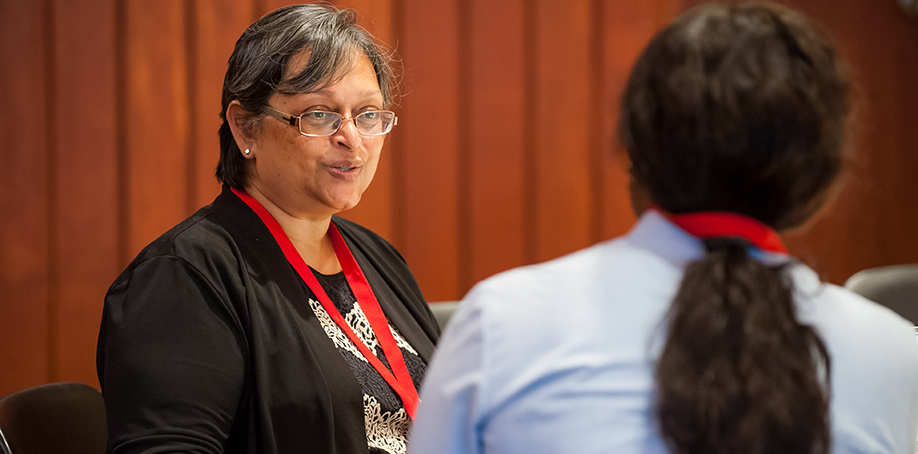
The ‘Meet-the-Experts’ sessions will give young researchers (junior to mid-career scientists) the possibility to attend network/group meetings with leading experts in the field of poverty-related and neglected infectious diseases. The sessions will offer an opportunity for informal discussions and will allow young researchers to present their questions and gain knowledge.
Structure of the sessions
Participants (junior to mid-career researchers) will have the opportunity to have a group conversation with experts in their field of interest. The groups’ sizes will be kept small so that each participant has sufficient time to ask questions, discuss a research topic of professional interest with the expert(s), exchange opinions, and form new connections. The ‘Meet-the-Experts’ sessions will run from Wednesday to Friday at lunchtime as indicated below:
- Wednesday 8 November 2023 (12:30-13:30)
- Thursday 9 November 2023 (12:30-13:30)
- Friday 10 November 2023 (12:30-13:30)
The exact location of the event will be confirmed at a later stage.
Signing up
Forum delegates can sign up to participate in the ‘Meet-the-Experts’ group/session via the Forum online registration form. Please note only delegates attending the Eleventh EDCTP Forum in person can sign up to the 'Meet the Experts' session.
Our Experts
Experts involved in the ‘Meet-the-Experts’ sessions include Senior Fellows, EDCTP2 Scientific Advisory Committee members, Networks of Excellence Mentors, Ethicists, Epidemiologists and EDCTP2 General Assembly members.
We are delighted to have the following experts joining our ‘Meet-the-Experts’ sessions during the Eleventh EDCTP Forum:
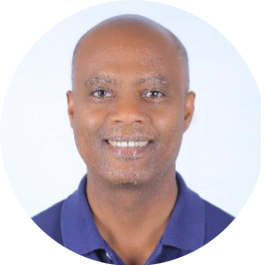
Dr Alemseged Abdissa
Dr Alemseged Abdissa is Deputy Director General of Armauer Hansen Research Institute (AHRI), Ethiopia since 2018. He is also an Associate Professor of Microbiology at Jimma University, where he led Jimma University Clinical and Nutrition Research group. He has ample experience in research undertakings and leadership focusing on research areas including HIV-AIDS, malnutrition and antimicrobial resistance. He has authored or co-authored over 90 scientific publications. Alemseged supervised 20 PhD and Masters students. He is the Director of the South and Eastern Africa TB programs network and coordinates the Pan-African Bioethics Initiative (PABIN). Alemseged is passionate about research/innovation capacity building in Africa. He co-led the development of a practical guide for institutionalization of research mentorship in LMIC in collaboration with WHO/TDR and partners. He is very much interested in community engagement, and translation and research outcomes to policy and practice. Dr Abdissa is a member of the Innovation Equity Forum (IEF) for women Health R&D Steering Committee, which is an initiative of the NIH and Bill & Melinda Gates Foundation. He is the representative of Ethiopia in the EDCTP General Assembly.
Areas of expertise: Infectious diseases; antimicrobial resistance; bioethics; research capacity building; research mentorship
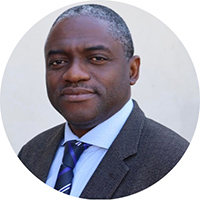
Professor Ayola Akim Adegnika
Professor Ayola Akim Adegnika obtained his medical degree from the Medical University of Libreville, Gabon and his PhD in Immuno-Epidemiology at the University of Tübingen, Germany, and a Master in Epidemiology at the London School of Hygiene & Tropical Medicine, United Kingdom. He is the Director of the Centre de Recherches Médicales de Lambaréné, (CERMEL), Gabon, and a Full Professor at the University of Tübingen, Germany, where he leads numerous research projects including applied (clinical trials), and basic research (immunological, and epidemiological studies) as well as clinical epidemiology of infectious diseases. He is involved in lecturing and training students and young scientists. He is a member of various national and international research networks and initiatives, including ARNTD, MNT-OCEAC, CANTRAM, WANETAM, DZIF, DTG, GLOHRA, ESR, CAIDERA, and ARRIGE. Furthermore, he is the representative at the EDCTP General Assembly from Gabon.
Areas of expertise: immunogenicity; immuno-epidemiology of malaria and helminths; vaccines and drugs clinical trials from Phase I to Phase IV

Dr Bernard Kikaire
Dr Bernard Kikaire is currently a Lecturer on Infectious Diseases and Research Methods at the College of Health Sciences at Makerere University, Uganda. He has more than 20 years of experience in HIV/AIDS research with a special focus on HIV care and treatment, and more than 15 years of coordinating research projects including five years of coordinating EDCTP projects. He is the Scientific Liaison Officer and leader of the HIV work package of the Eastern Africa Consortium for Clinical Research (EACCR), a network of excellence initiative funded by EDCTP. He is the scientific leader of the AccessAfrica2 project which seeks to strengthen regulatory and ethics review of clinical trials in Africa. He was one of the principal investigators in the recently concluded performance evaluation of the m-PIMA point-of-care viral load (PoC-VL) monitoring platform, which led to the adoption of the technology for use as PoCVL monitoring platform among pregnant women and breastfeeding mothers leaving with HIV. He is currently the Principal Investigator of the East African Point-of-Care Viral Load Monitoring study, which seeks to evaluate the effectiveness, feasibility, and acceptability of Point-of-Care Viral Load monitoring in children and Adolescents in East Africa. He has good experience in research ethics having been a member of the UVRI Research and Ethics Committee for three years. Furthermore, he is a certified GCP trainer from South Africa.
Areas of expertise: HIV/AIDS; infectious diseases research; ethics; point-of-care viral load
Professor Catherine Hankins
Prof. Catherine Hankins MD PhD FRCPC CM is Professor, Department of Global & Public Health, School of Population & Global Health, Faculty of Medicine and Health Sciences, McGill University, Montreal and Senior Fellow, Amsterdam Institute for Global Health & Development, Department of Global Health, University of Amsterdam. She was Scientific Chair for six annual INTEREST conferences on HIV Treatment, Pathogenesis, and Prevention Research in Resource-Limited Settings (Harare 2015, Yaoundé 2016, Lilongwe 2017, Kigali 2018, Accra 2019, Windhoek 2020) and EDCTP’s 10th Forum (Maputo, Mozambique (2021). She was Chair of EDCTP’s Scientific Advisory Committee from 2017 to 2022 and and was Co-Chair of Canada’s COVID-19 Immunity Task Force April 2020-December 2022. She is Scientific Co-Chair for the Eastern Europe & Central Asia INTERACT workshops (2019 Almaty, Kazakhstan; 2022 Riga, Latvia; and 2024 Tashkent, Uzbekistan)
Chief Scientific Adviser to UNAIDS for a decade, she led the scientific knowledge translation team, convening mathematical modelling teams, supporting country implementation of proven biomedical HIV prevention modalities, and focusing on ethical HIV prevention trial conduct and good participatory practices (GPP). She led the creation of GPP for Emerging Pathogens (2016) for WHO’s R&D Blueprint. A trustee of the HIV Research Trust, board member of AVAC, emeritus board member of HealthBridge, and member of the International AIDS Society Industry Liaison Forum, she was named to the Order of Canada in 2013 and is a 2024 Laureate of Canada’s Medical Hall of Fame.
Professor Catherine Orrell
Prof. Catherine Orrell is an HIV Clinician and Clinical Pharmacologist. She has been PI on more than 20 antiretroviral clinical trials since 2004: including a range of efficacy, toxicity, interaction and dosing studies. She has in-depth experience of conducting research in both state-of-the-art research facilities at the University of Cape Town; as well as in primary healthcare clinic environments. She is a current EDCTP2 Senior Fellow and leads a clinical research site in Gugulethu, the DTHF Centre for Adherence and Therapeutics (D-CAT). The site is currently conducting clinical trials of novel methods to monitor and improve ART adherence; as well as exploring the use of long-acting antiretroviral therapy in adolescents and young people living with HIV.
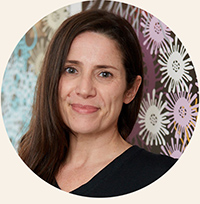
Dr Catherine Riou
Dr Catherine Riou is a Chief Research Officer in the Division of Medical Virology, Department of Pathology at the University of Cape Town, South Africa. She is also a contributing investigator to the Wellcome Centre for Infectious Disease Research in Africa (CIDRI-Africa), a full member of the Institute of Infectious Disease and Molecular Medicine (IDM), UCT, and an EDCTP Senior Fellow.
After completing her PhD in France (University of Lyon), Catherine started working in the HIV field as a postdoctoral researcher in Montreal (Canada). In 2007, she moved to South Africa to study the role of T-cell immunity in controlling HIV replication. Living and working at an epicentre of the TB/HIV pandemic, she has broadened her field of expertise to include tuberculosis. In 2020, she also started projects focused on SARS-CoV-2. As an infectious disease immunologist, her research interests include the investigation of Mycobacterium tuberculosis (Mtb)-specific T-cell responses across the spectrum of tuberculosis infection; the impact of HIV-co-infection on host immune response against Mtb; and SARS-CoV-2-specific T-cell responses in the context of natural infection and vaccination
Areas of expertise: tuberculosis; SARS-CoV-2; T-cell response; flow cytometry
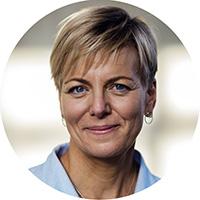
Dr Christine Stabell Benn
Dr Christine Stabell Benn has worked at the Bandim Health Project in Guinea-Bissau since 1993. Dr Benn holds a position as Professor of Global Health at University of Southern Denmark; and she is also Chair at the Danish Institute for Advanced Study.
Dr Benn’s research focuses on health interventions and their effect on overall health in real life. Vaccines and vitamins affect overall health to a much larger extent than explained by their well-known specific effects; they also have so-called “non-specific effects”. These effects are often sex-differential, and they may affect each other, making the sequence and combination of health interventions more important than usually thought.
Dr Benn has taken the observations on non-specific effects forward to randomized controlled trials testing the overall health effects of vitamin A supplementation, BCG, oral polio, and measles vaccine. She also took tested whether non-specific effects of vaccines are important in high-income settings. Furthermore, she explored the biological mechanisms underlying the non-specific effects.
The results have been shared in >340 scientific articles. Dr Benn (@StabellBenn) is on the top-100 lists of most powerful people in Danish Health and the most powerful Danish health researcher on social media.
Areas of expertise: Vaccines, child mortality, infectious diseases control, female scientists, equity in science, COVID-19
Professor Collen Masimirembwa
Areas of expertise: pharmacogenomics in drug discovery and development; precision medicine drug metabolism; pharmacokinetics in clinical research
Dr Derseree Archary
Areas of expertise: Immunology and PrEP
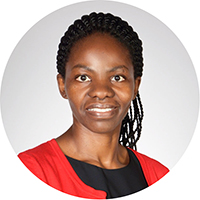
Dr Esther Buregyeya
Dr Esther Buregyeya is a Ugandan physician trained in public health and a research expert in disease control. She is an Associate Professor and Chair of the Department of Disease Control and Environmental Health at Makerere University School of Public Health, Uganda. She has 20 years of experience in service including clinical work in a district as a medical officer, teaching and research. Furthermore, she has a strong background in field research with over 15 years of experience in designing and implementing community and facility-based research, mainly in tuberculosis, HIV-AIDS, malaria and mHealth. She also has experience in doing longitudinal research including clinical trials in HIV and malaria and in qualitative research methods and implementation science. She is committed to seeking innovative solutions to public health problems with a specific focus on tuberculosis, HIV and antimicrobial resistance. She has interest and expertise in the use of mHealth technologies to improve linkage to care and retention as well as adherence to treatment among tuberculosis patients. She works with her partners from the University of Georgia on an R021 (1R21 TW011365-01-Juliet Sekandi) ‘DOT Selfie: A Mobile Health Intervention with Transfer of Social Bundle Incentives to Increase Treatment Adherence in Tuberculosis Patients in Uganda’. Currently, she is implementing a randomized-controlled trial leveraging SMS reminders, phone calls and monetary incentives in improving linkage to care of presumptive TB patients.
She has been engaged in capacity building and mentorship programs for more than 15 years as a Lecturer. She participates in teaching including research methods, communicable and non-communicable disease control interventions, and ‘One Health’ to undergraduate and graduate students. She has also supervised more than 25 graduate students to completion. Through these years, she has developed capabilities to design, implement and lead research activities.
Areas of expertise: TB, antimicrobial resistance (AMR), HIV
Dr Francisco Saúte
Other relevant past positions, include (i) Director of the National Malaria Control Program and Head of Communicable Disease Division at the Ministry of Health in Mozambique; ii) Lecturer and Course Organizer (Medical Epidemiology) at the Medical School/Eduardo Mondlane University; iii) 7-year international experience as USAID Resident Advisor for the US President’s Malaria Initiative in Angola and Rwanda.
Dr Saúte plays a technical leadership role in malaria elimination initiatives, in the SADC region. In Mozambique, he is a member of the Malaria Technical Advisory Committee to the Minister of Health. He earned his PhD in Malaria Epidemiology from the University of Barcelona, Spain; his Master’s Degree in Communicable Disease Epidemiology from the University of London (LSHTM) in the United Kingdom; and his Medical Degree from the Eduardo Mondlane University, in Mozambique.
Areas of expertise: malaria epidemiology, malaria elimination, leadership
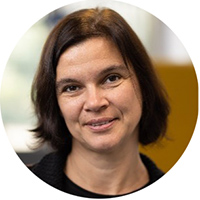
Dr Georgia Schäfer
Dr Georgia Schäfer obtained her PhD from Humboldt University Berlin, Germany, in 2003 in Molecular Biology where she specialized in cancer research and infectious diseases. She then completed a post-doc at the University of Cape Town (UCT), South Africa, focusing on the innate immune receptors involved in infection with Mycobacterium tuberculosis, before taking up a research scientist/lecturer position in the Division of Medical Biochemistry at UCT in 2010. She has also been a Member of the Institute of Infectious Disease and Molecular Medicine (IDM) in the Faculty of Health Sciences at UCT since 2015.
Georgia is currently leading the research group “Virology-Emerging Viruses” at the International Centre for Genetic Engineering and Biotechnology (ICGEB) Cape Town, South Africa, where her group investigates the infection mechanisms of Kaposi’s sarcoma herpesvirus (KSHV) and Human papillomavirus (HPV), two oncogenic viruses associated with AIDS-defining malignancies, with the long-term aim of developing novel preventative and diagnostic tools. In response to the COVID-19 pandemic, Georgia’s group has set up several SARS-CoV2 diagnostic and pseudovirus neutralization assays to support ongoing nation-wide research activities.
Georgia is holding research grants from various South African funding agencies and has been awarded an EDCTP Senior Fellowship in 2019. She has published about 50 articles in peer-reviewed journals with approximately 2400 citations and an h-index of 24. She currently supervises one post-doctoral fellow, seven PhD students and one MSc student in the laboratory.
Areas of expertise: Basic and clinical research in South Africa
Professor Harleen Grewal
Harleen Grewal is Professor of Microbiology (2002) and Global health (2013) (University of Bergen, Norway) and Consultant Physician at the Haukeland University Hospital, also in Bergen. An MD (1987, University of Maharashtra, India), she trained in medical microbiology at the All India Institute of Medical Sciences (1991) and the Haukeland University Hospital (2000). In 1995, she obtained a PhD in molecular microbiology (University of Bergen).
Prof. Grewal conducts research on the molecular pathogenesis of diarrhoeal and respiratory pathogens. Her research focuses on tuberculosis and acute respiratory infections, including building site capacity for TB vaccine efficacy testing, antimicrobial resistance, and rapid point-of-care diagnostics to improve personalised therapy. Prof. Grewal has been involved in collaborative international work in Europe, Africa (South Africa, and Tanzania), and Asia (India and Nepal).
She is the recipient of the Schering-Plough prize (microbiology) and the Søren and Sigurd Falch award (medical research).
Areas of expertise: Tuberculosis, clinical trials (diagnostic stewardship) in acute lower respiratory infections

Dr Ilse Marion Sumari-de Boer
Dr Ilse Marion Sumari-de Boer is a Senior Fellow at EDCTP focusing on clinical studies, including mixed-methods research using digital health interventions. She obtained her PhD at the University of Amsterdam in research focusing on adherence to treatment among people living with HIV. Through the Panacea consortium, she started working at the Kilimanjaro Clinical Research Institute in Moshi, Tanzania, where she has built a strong team of researchers and research assistants. In addition, she is an honorary lecturer at the Kilimanjaro Christian Medical University College (Moshi, Tanzania) and a research fellow at Amsterdam Institute for Global Health and Development (The Netherlands). In 2016 she was awarded a career development fellowship from EDCTP for a clinical trial investigating the effect of an internet-enabled medication dispenser with reminder cues and tailored feedback on adherence to treatment. She completed the fellowship in 2020 when she was awarded a senior fellowship plus from EDCTP, focusing on studies using digital adherence tools for breastfeeding women, children and adolescents. Within that current fellowship, she supervises two PhD students, one in Tanzania and one in Malawi, and two MSc students in Tanzania. Marion is also the Tanzanian PI of the EA-PoC study, wherein she also supervises another PhD and MSc student. Furthermore, she has been involved in studies in digital adherence tools for TB patients and digital health tools for family planning and contraceptive use in Tanzania. Marion has a strong motivation for mentorship and supervision to create a pool of well-trained researchers in Tanzania and other SSA countries.
Areas of expertise: Clinical trials; implementation science; digital health
Dr Joseph Fokam
Dr Joseph Fokam is a virologist, and a Senior Health Scientist and Lecturer of Medical Virology, and the Head of the Virology Laboratory of the Chantal BIYA International Reference Centre for Research (CIRCB) on HIV/AIDS prevention and management, which is a reference laboratory for clinical monitoring and surveillance of HIV drug resistance among people living with HIV in Cameroon, according to the World Health Organisation (WHO). He is also a trained WHO Expert on in vitro diagnostics for HIV, viral hepatitis, and other infections (WHO Afro, MELT 2016). Dr Fokam is also the COVID-19 focal institutional point at CIRCB, which is a national reference laboratory for the molecular diagnosis of COVID-19 and for sequencing of SARS-CoV-2 within the frame of the genomic surveillance of COVID-19 variants in Cameroon. Within the national response to COVID-19, Dr Fokam also serves as a laboratory expert at the lab unit of the COVID-19 National Public Health Emergency Operations Coordination Centre (NPHEOCC) in Cameroon.
At professional level, Dr Fokam is a member of the WHO HIV Drug Resistance Working Group (ResNet), a member of the International AIDS Society (IAS), a member of the American Society for Microbiology (ASM Global Outreach), and a member of the Cameroon Academy of Young Scientists (CAYS). From a scientific perspective, Dr Fokam is an Editor in scientific journals, such as PLOS ONE, Current HIV Research journals, and the Journal of Public Health in Africa, and he also serves as a reviewer for several international journals. He is a consultant and grant recipient on HIV/AIDS and COVID-19 projects. He holds several awards on HIV/AIDS and COVID-19. He holds several grants among which EDCTP is one of his major funders (CDF on HIV and RIA on COVID-19).
He has co-authored 139 scientific publications in peer-reviewed journals, covering topics on HIV/AIDS, viral hepatitis, COVID-19, and other emerging infectious diseases.
Area of expertise: HIV/AIDS, viral hepatitis, COVID-19, emerging infectious diseases.
Dr Khadija I. Yahya-Malima
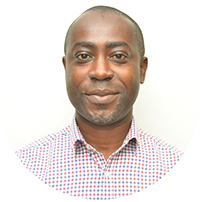
Dr Kwadwo Asamoah Kusi
Dr Kwadwo Asamoah Kusi is an Associate Professor in the Department of Immunology, Noguchi Memorial Institute for Medical Research (NMIMR), a constituent of the College of Health Sciences, University of Ghana. He started his career as a research scientist at NMIMR in 2012 after graduating with a PhD in medicine (vaccine immunology) from the Leiden University Medical Centre, Netherlands, based on his research at the Biomedical Primate Research Centre in Rijswijk, the Netherlands. His research focus has been on antigen-induced cellular and humoral immune responses to various pathogens. He is currently working with collaborators at the US Naval Medical Research Center on identifying protection-associated T cell and antibody epitopes for malaria, Lassa fever and COVID-19. These epitopes will ultimately be for designing disease-specific multi-epitope vaccines. He is the principal investigator of an EDCTP2-funded Senior Fellowship that is investigating the impact of hepatitis B and Plasmodium co-infections on the liver. He is also the lead immunologist for a number of clinical trials that have been done at NMIMR over the last four years. He is faculty at the West Africa Centre for Cell Biology of Infectious Pathogens (WACCBIP) based at the Department of Biochemistry, Cell and Molecular Biology, University of Ghana.
Areas of expertise: malaria immunology; vaccines; clinical immunology
Professor Mahamadou Ali Thera
Mahamadou Ali Thera, MD, MPH, PhD, FAAS, is the Scientific Director of the Bandiagara Malaria Program (BMP), an MRTC research program within University of Sciences Techniques and Technologies of Bamako, that conducts complex research on the pathogenesis of simple and severe malaria, host-parasites interactions, clinical trials of vaccines and drugs against malaria and other infectious diseases.
An internationally recognized expert in the clinical development of malaria vaccines, he has been a member of the Scientific Advisory Board of several international bodies including the WHO Scientific Committee on Malaria Vaccine, MALVAC, and JTEG, European Vaccine Initiative (EVI), of which he has been a member since 2010, and chairman of the scientific committee from January 2015 to December 2017. He also served on the DSMB of several clinical trials of vaccines against malaria, Ebola virus disease, and Lassa fever. Prof Thera is a member of the Academy of Science of Mali since April 2018 and a Fellow of the African Academy of Sciences since August 2020. He has co-authored more than 130 articles in international journals indexed in PubMed.
He extensively interacts with scientific bodies and various collaborators, serve in technical and advisory boards at national and international institutions, and is an expert consultant for international organizations to lead trainings on malaria diagnostic in West African countries.
Areas of expertise: Malaria epidemiology, malaria pathogenesis, clinical trials, product clinical research and development, ethics, parasitic diseases
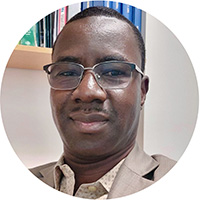
Dr Makhtar Niang
Dr Makhtar Niang is a Research Scientist and the Deputy Head of the Immunophysiopathology & Infectious Diseases Department at Institut Pasteur de Dakar, Senegal. His field of specialization is molecular parasitology and my training is multi-disciplinary and cross-cultural. Dr Niang’s primary research work is centered on a global understanding of the biology of the human malaria parasites and their interactions with their human and vector hosts in different epidemiological strata, to ultimately contribute with novel tools and the design of targeted interventions to improve the control of the malaria and progress towards its elimination. In his current position, his work has been focused on the development, evaluation and validation of sensitive and innovative laboratory and point-of-care diagnostics to accelerate the detection of the major P. falciparum, and the neglected non-falciparum malaria parasites towards the goal of malaria elimination. Leveraging on his experience and successes in the field of malaria, he is now leading novel research on integrated surveillance for the simultaneous detection of multiple pathogens using multiplex serological and molecular approaches. Dr Niang’ current roles include the scientific and administrative management of research projects from various donors (EDCTP, ERC, NIH, PATH, BMGF, ROTARY, CDC etc.), and the direct supervision of a research group of ten junior scientists at master II, PhD, and postdoc level, and research technicians.
He extensively interacts with scientific bodies and various collaborators, serve in technical and advisory boards at national and international institutions, and is an expert consultant for international organizations to lead trainings on malaria diagnostic in West African countries.
Areas of expertise: malaria, diagnostics, elimination
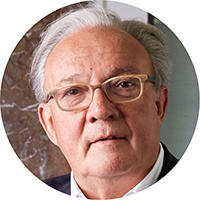
Professor Marcel Tanner
Professor Marcel Tanner was Director of the Swiss Tropical and Public Health Institute from 1997-2015. He acted as Professor and chair of Epidemiology/Public Health and Medical Parasitology at the Faculties of Science and Medicine of the University of Basel until his retirement in 2017. He is now president of the Swiss Academies of Arts and Sciences. He devoted his professional life to global public health; particularly to develop new drugs and vaccines for the control and elimination of malaria and other poverty-related diseases and NTDs as well as to find new solutions to strengthen health systems in Africa, Asia and the Pacific region. As a leading expert on communicable diseases research and control, health systems strengthening and training/capacity building he is member and advisor of various national and international agencies/bodies and in boards/committees such as WHO, Wellcome Trust, DNDi, FIND, INCLEN-Trust, Botnar Foundation and EDCTP. Marcel Tanner was key in building up through partnership research, resources and implementation/service institutions in Africa and Asia, namely the Ifakara Health Institute (IHI) in Tanzania and the Centre Suisse de Recherches Scientifiques (CSRS) in Côte d’Ivoire.

Dr Marieke M van der Zalm
Dr Marieke M van der Zalm is a paediatrician with over 10 years of experience working in the field of paediatric tuberculosis (TB) at the Desmond Tutu TB Centre, Stellenbosch University, South Africa. Despite increasing evidence demonstrating long-term pulmonary sequelae post pulmonary TB in adults, the long-term respiratory morbidity in children with TB and other respiratory pathogens living in low- and middle-income countries is unknown. In 2017, she received an EDCTP early career fellowship to establish the short-term outcomes of pulmonary TB in children. In 2020, I was awarded a senior EDCTP career fellowship (TMA2019SFP-2836 TB lung FACT-2) and NIH-K43 Emerging Global Leadership award (K43TW011028) to investigate the long-term outcomes of children with presumptive TB, with ongoing studies in South Africa and Mozambique. Her long-term career aim is to conduct globally relevant research that impacts on policies and guidelines to improve the lung health of children affected by TB and other respiratory illnesses. She has been involved in several guideline groups on post-TB and has co-chaired the 1st and 2nd international Post-TB Symposia in Stellenbosch in 2019 and 2023.
Areas of expertise: Lung health, tuberculosis (and post TB), LRTIs, mentorship, brainstorming
Professor Moses Bockarie
Professor Moses John Bockarie is Adjunct Professor at Njala University, Bo, Sierra Leone and Honorary Professor at the University of Cape Town, South Africa. He was Director of International Cooperation (Africa) and Head of Africa Office of the European and Developing Countries Clinical Trials Partnership (EDCTP) from July 2008 to April 2023. He obtained his Bachelor’s degree in Zoology from the University of Sierra Leone and a Master's and PhD in tropical health sciences from the Liverpool School of Tropical Medicine. Prof. Bockarie, a Fellow of the Royal College of Physicians of Edinburgh, is a specialist in the field of neglected tropical diseases and an internationally experienced researcher. He has worked in many countries in Africa, Europe and the Pacific region, and in the United States of America. Professor Bockarie has served as Chair of the WHO/TDR Scientific Working Group for Vectors, Environment and Society and member of the WHO-AFRO Regional Programme Review Group for Neglected Tropical Diseases. He currently serves on WHO Regional Expert Advisory Committee on Traditional Medicine for COVID-19.
Areas of expertise: capacity development, neglected infectious diseases, malaria
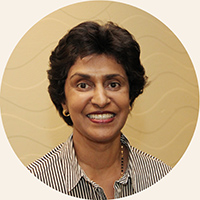
Professor Nesri Padayatchi
Professor Nesri Padayatchi is a clinician, scientist, and epidemiologist with a Masters in Epidemiology from Columbia University, New York, and a PhD in drug-resistant tuberculosis (TB). She was the Deputy Director of CAPRISA, and lecturer in the Department of Community Medicine at the University of KwaZulu-Natal Nelson Mandela School of Medicine, in Durban, South Africa. She has more than 30 years of clinical and research experience in the management of TB and related problems and has published widely in peer-reviewed journals. She has contributed to the training of more than 1,300 undergraduate and postgraduate students as part of a team or in her personal capacity. She serves on several boards including the South African National and Provincial Advisory Boards for MDR –TB; the International Union against TB and Lung Diseases Ethics Advisory Group as well as on several Scientific Advisory Boards. She is a member of ASSAf. Her biggest scientific contribution has been as a co-investigator in the SAPiT and STRIDE (A5221) studies which changed not only South African guidelines for the management of patients with TB-HIV co-infection, but also WHO and DHHS guidelines.
Areas of expertise: clinical trials in tuberculosis

Professor Olufunmilayo I. Fawole
Professor Olufunmilayo Fawole is a Professor in the Department of Epidemiology and Medical Statistics, Faculty of Public Health, College of Medicine, University of Ibadan. She is a Fellow of both the Nigerian and West African College of Public Health. She also has a Masters (MSc-Epi and Bio) from the University of Witwatersrand and a PhD from the University of Kwa Zulu Natal, South Africa. She is the immediate past Dean of the Faculty of Public Health. For over 25 years, she has been training Epidemiologist in Nigeria and sub-Saharan Africa, and has worked with AFENET and WHO Nigeria, in this regard. Prof. Fawole has implemented funded research on prevention of communicable diseases, Gender based violence and more recently on the COVID-19 response and digital health interventions. She has published in both local and international journals and has over 150 publications till date. She was listed among the World Top 2% researchers globally as compiled by Stanford University for 2020 and 2021 impact (Elsevier common data) year released in 2021 and 2022. She is the coordinator of the EDCTP Grant CSA2020E- 3134 for the MPH in Epidemiology and Biostatistics with specialty in Disease Outbreak and Epidemic Response.
Areas of expertise: COVID-19 outbreak response, epidemiology training, women in research and student
Professor Pauline Byakika-Kibwika
Prof. Pauline Byakika-Kibwika is a Professor of Internal Medicine and Epidemiology and Head of Internal Medicine at Makerere University, Uganda. She graduated with a Doctor of Philosophy in Clinical Pharmacology and Pharmacokinetics from Trinity College Dublin, Ireland, and she is a Fellow of the Royal College of Physicians of Edinburgh and the Uganda National Academy of Sciences. Her ongoing research is focused on optimising treatment for HIV-malaria co-infected individuals, and investigation of antimalarial drug resistance patterns and mechanisms, funded by an EDCTP2 Senior Fellowship grant. She was recently awarded a HORIZON-JU-GH-EDCTP3 grant to scale up her current work in the East African Region. She serves on the pioneer accreditation committee for research ethics committees (RECs) for over 10 years and led capacity-building efforts for RECs in reviewing research protocols with complex and emerging study designs in Uganda. She also serves on the Uganda Ministerial Scientific Advisory Committees on COVID-19, Malaria and Ebola Haemorrhagic Fever and as Commissioner on the East African Health Research Commission.
Areas of expertise: HIV, Malaria, Ebola, COVID-19, Pharmacokinetics

Dr Phebian Ina Grant Sagnia
Dr Phebian Ina Grant Sagnia, has been a nurse for a decade and has a passion for caring and advocating for health and well-being. She pursued a MSc in Nursing from the National Taipei University of Nursing and Health Sciences, Taiwan, from 2011 to 2013. Also, she obtained an MSc in Reproductive Health from the University of Benin, Nigeria, from 2015 to 2017. Currently, she is a Senior Nursing Officer and Principal Health Researcher at the Ministry of Health in the Gambia. She is a clinical assessor and research supervisor for nursing students at the School of Nursing and Midwifery as well as the Department of Nursing and Reproductive Health at the University of the Gambia. She is a former part-time lecturer at the American International University in The Gambia. Moreover, she is a co-principal Investigator in research on strengthening access to quality comprehensive health education amongst in and out-of-school adolescents in the Gambia and funded by the International Development Research Centre (IDRC). She is a member of the Scientific Coordinating Committee at the Gambia Government Joint MRC Ethics Committee representing MoH. Her practice focuses on nursing care and her research focuses on sexual and reproductive health, especially, on adolescent sexual and reproductive health rights.
Areas of expertise: nursing; reproductive health; health education

Professor Richard A Adegbola
Professor Richard Adegbola’s background training is in Microbiology obtained in Nigeria and United Kingdom. He holds a PhD in Medical Microbiology and Bacteriology, University of Dundee. Currently, he works as a Research Professor at Nigerian Institute of Medical Research and a consultant for Immunization & Global Health, RAMBICON. Prior to this, he worked in diagnostic microbiology, academia, philanthropy, and pharmaceutical industry, across three continents. He has written six book chapters and co-authored 247 publications in peer- reviewed journals on vaccine and vaccine-preventable diseases. The overall direction of his work is aimed at prevention of pneumonia and reduction of child mortality. Prof Adegbola has achieved many recognitions of his work including, honorary Professorship of University of Leicester, England, admission to Fellowships of the Royal Colleges of Pathologists and Physicians, London and, election to Fellowships of the Nigerian Academy of Science and African Academy of Sciences. Professor Adegbola was a member of WHO’s Meningitis Vaccine Project Advisory Group. Currently he serves as a member of WHO Africa Regional Immunisation Technical Advisory Group and the SABIN Vaccine Institute’s Board of Trustees. He is Chair of Advisory Board for BactiVac Network and, Vice-Chair of European and Developing Countries Clinical Trials Partnership Scientific Advisory Committee.
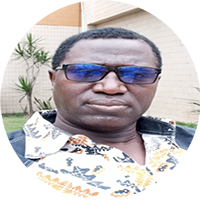
Dr Samba Cor Sarr
Dr Samba Cor Sarr has a PhD degree in health systems, implementation research and in the regulation of clinical trials. He is the Head of the Research Division at the DPRS, Senegal, and a permanent secretary of the National Ethics Committee of health research since 2004. He is an Associate Teacher at UCAD, Christopher University, Alexandria University, Amadou Hampathé Bâ University and ENDSS. Dr Sarr is the Principal Investigator of several projects funded by EDCTP, IDRC, WHO, and the World Bank. He is a member of the West African Network of Ethics Committees, proposed by the State of Senegal to be a member of COMEST in 2022 and the representative of Senegal at the General Assembly of EDCTP.
Areas of expertise: ethics of artificial intelligence
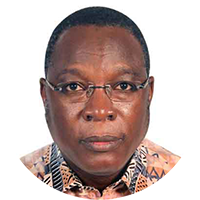
Professor Seni Kouanda
Professor Seni Kouanda is a medical epidemiologist with a doctorate in medicine from the University of Ouagadougou, Burkina Faso, a master’s in public health from Université Libre de Brussels, and a PhD from the School of Public Health, Université Catholique de Louvain, Belgium.
He is a senior researcher and Head of the Biomedical and Public Health Department of the Institut de Recherche en Sciences de la Santé (IRSS), and Professor in epidemiology of Institut Africain de Santé Publique” (IASP), Director of the Doctoral School of Sciences, Technology and Health (ED/2ST) of the Université Saint Thomas d’Aquin (USTA) and EDCTP Senior research fellow. He is the coordinator of the regional HUB for Training and Research in Reproductive Health for Francophone Africa (HRP/WHO). He led the national ethic committee for 7 years (2013-2020).
He has carried out research on various topics including HIV/AIDS, reproductive health, nutrition, infectious diseases, and health system research. He has widely published in peer-reviewed journals (local and international) in more than 200 scientific articles. He has conducted research funded by several funding organisations (WHO, EDCTP, UNICEF, WB, UNFPA, USAID, EU, IDRC, BMGF, EDM) in the context of West African countries.
Prof. Kouanda is committed to reinforcing the Francophone West Africa countries’ capacities in epidemiology for disease preparedness and control.
Areas of expertise: epidemiology, scientific writing (journal article, abstract, etc.); scientific leadership

Professor Thirumalaisamy Velavan
Professor Thirumalaisamy Velavan is a professor and a senior academic councilor at the University of Tübingen, Germany, and leads projects on infectious diseases. He is a member of the EDCTP-funded Pan African Network for Rapid Research, Response, and Preparedness for Infectious Diseases Epidemics (PANDORA-ID-NET) consortium, which aims to strengthen, sustain multidisciplinary capacities on pandemic preparedness. He is the project coordinator for Europe in the EDCTP-funded Central African Clinical Research Network (CANTAM) which aims to build individual, and institutional capacities to conduct GCP/GCLP-compliant clinical research. He also is the principal investigator for the global health hub 'PAN ASEAN Coalition for Epidemic and OUtbreak Preparedness (PACE-UP)', that leverages on Asia-Europe-Africa (South-South) partnerships to combat emerging and remerging infectious diseases.
Prof. Velavan has published >200 articles with an h-index of 42. He serves in the editorial board of several journals and review board of international funding agencies. He is the recipient of the 2021 Tropical Medicine Award of the German Society for Tropical Medicine and Global Health. He has extensive experience in training, developing, and nurturing the younger generation of scientists through high-quality training and mentoring, particularly in low- and middle-income countries, especially from Africa and Asia.
Area of expertise’s: Infectious diseases, capacity building, mentorship
The European & Developing Countries Clinical Trials Partnership
The Eleventh EDCTP Forum is hosted by the Ministry of Higher Education and Research of France and ANRS | Emerging Infectious Diseases,
and will be jointly supported by the second EDCTP programme (EDCTP2) and the Global Health EDCTP3 Joint Undertaking.
© Copyright 2023 EDCTP